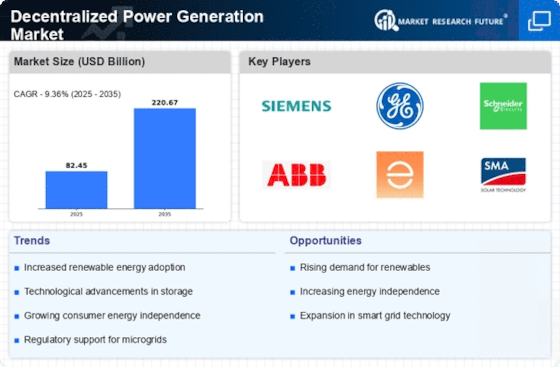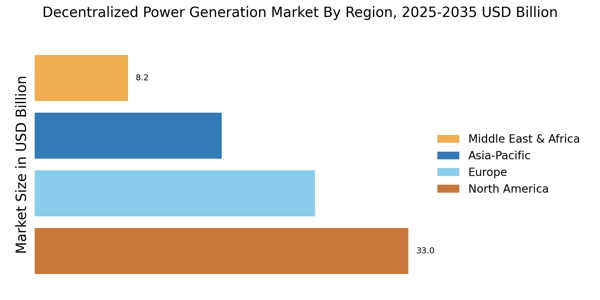Rising Energy Demand
The Decentralized Power Generation Market is experiencing a surge in energy demand, driven by urbanization and industrial growth. As populations expand and economies develop, the need for reliable and efficient energy sources becomes paramount. According to recent data, energy consumption is projected to increase by approximately 30% by 2040. This rising demand compels stakeholders to explore decentralized solutions that can provide localized energy generation, thereby reducing transmission losses and enhancing energy security. Furthermore, the shift towards electrification in various sectors, including transportation and heating, further amplifies this demand. Consequently, the Decentralized Power Generation Market is poised for growth as it offers innovative solutions to meet these evolving energy needs.
Technological Innovations
Technological advancements play a crucial role in shaping the Decentralized Power Generation Market. Innovations in energy storage, smart grid technologies, and microgrid systems are enhancing the efficiency and reliability of decentralized energy solutions. For instance, the integration of battery storage systems allows for better management of energy supply and demand, enabling consumers to utilize renewable energy more effectively. Furthermore, the rise of Internet of Things (IoT) applications in energy management facilitates real-time monitoring and optimization of energy usage. As these technologies continue to evolve, they are expected to drive down costs and improve the overall performance of decentralized systems. The Decentralized Power Generation Market stands to gain from these advancements, as they enable more widespread adoption and integration of renewable energy sources.
Policy and Regulatory Frameworks
The Decentralized Power Generation Market is significantly shaped by supportive policy and regulatory frameworks. Governments worldwide are implementing policies that encourage the adoption of decentralized energy systems, including feed-in tariffs, tax incentives, and renewable energy mandates. These measures aim to facilitate the transition towards cleaner energy sources and empower consumers to generate their own electricity. For example, some regions have established net metering policies that allow individuals to sell excess energy back to the grid, promoting the economic viability of decentralized systems. As regulatory environments become more favorable, the Decentralized Power Generation Market is likely to witness increased participation from both residential and commercial sectors, further driving market growth.
Environmental Sustainability Initiatives
The Decentralized Power Generation Market is significantly influenced by the growing emphasis on environmental sustainability. Governments and organizations are increasingly prioritizing the reduction of carbon emissions and the promotion of clean energy sources. This trend is reflected in various international agreements aimed at combating climate change, which advocate for a transition to renewable energy. The market for decentralized power generation, particularly solar and wind technologies, is expected to expand as these sources align with sustainability goals. Data indicates that renewable energy sources accounted for nearly 30% of total electricity generation in recent years, highlighting the shift towards greener alternatives. As environmental concerns continue to shape energy policies, the Decentralized Power Generation Market is likely to benefit from increased investments and innovations in sustainable technologies.
Consumer Empowerment and Energy Independence
The Decentralized Power Generation Market is witnessing a shift towards consumer empowerment and energy independence. As individuals and businesses seek greater control over their energy sources, decentralized systems offer a viable solution. The ability to generate electricity on-site not only reduces reliance on traditional utility providers but also enhances resilience against grid failures. This trend is particularly appealing in regions prone to power outages or where energy costs are high. Data suggests that a growing number of households are investing in solar panels and other decentralized technologies, reflecting a desire for self-sufficiency. As consumer awareness and demand for energy independence increase, the Decentralized Power Generation Market is expected to expand, driven by innovations that cater to these preferences.

















